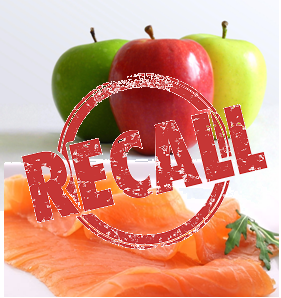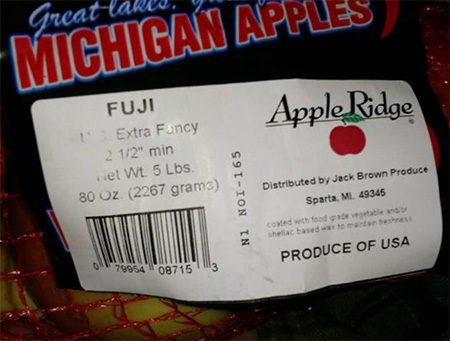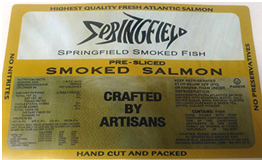Listeria Recalls in the News: due to Raw Apples and Smoked Salmon Fish
Raw Apples Recall
 The FDA announced that Jack Brown Produce, Inc. of Sparta, MI had recalled Gala, Fuji, Honeycrisp and Golden Delicious apples due to the potential contamination with Listeria monocytogenes. The contaminated apples were processed and shipped by their supplier Nyblad Orchards, Inc., on December 11 through December 16, 2017.
The FDA announced that Jack Brown Produce, Inc. of Sparta, MI had recalled Gala, Fuji, Honeycrisp and Golden Delicious apples due to the potential contamination with Listeria monocytogenes. The contaminated apples were processed and shipped by their supplier Nyblad Orchards, Inc., on December 11 through December 16, 2017.
The apples were distributed to retail stores in Michigan, Georgia, Missouri, Indiana, Ohio, and include the following varieties:
- Honeycrisp apples in two-pound clear plastic bags;
- Gala, Fuji, and Golden Delicious apples in 3-pound clear plastic bags;
- Fuji and Gala apples in 5-pound red-netted mesh bags; and
- Gala, Fuji and Honeycrisp apples that were tray-packed/individually sold.

The apples were sold under the “Apple Ridge” name. Originally only whole fresh apples are implicated in this recall. However, on December 22, 2017, the FDA announced the recall of red/green apple slices. The recalled apples slices were distributed in Michigan, Ohio, and Wisconsin in retail stores and through distributors. The contamination was noted in a single sample that was taken from related gala apple products.
Recalled Apples were sold at ALDI stores in North Carolina, South Carolina, Ohio, Georgia, Indiana and Kentucky starting Dec. 13.
Kroger supermarket chain recalled lunchbox-size Fuji and Galas sold between Dec. 12 and Tuesday. In addition individual pieces of fruit, the recall includes Michigan-grown apples sold in 5-pound bags. The products were sold in Kroger stores in various cities in Georgia, South Carolina, Alabama, Ohio, Virginia, Michigan, Kentucky, Tennessee and West Virginia.
As a result of the Fresh-Pak Inc. recall, Meijer recalled Meijer brand packaged products due to sliced apples within the products being potentially contaminated with Listeria monocytogenes.
Routine sampling at Nyblad Orchards, Inc. facility showed the presence of Listeria monocytogenes in some of the apples. The distribution of these apples was stopped. The company said that no illnesses were reported to date.
In the past several years there have been a number of recalls associated with raw apples and caramel apples. There have been a few studies that investigated the potential source of Listeria monocytogenes in raw apples.Salazar et al. (Fate of Listeria monocytogenes in Fresh Apples and Caramel Apples. Salazar JK, Carstens CK, Bathija VM, Narula SS, Parish M, Tortorello ML) showed that fresh apples inoculated with Listeria monocytogenes at the steam were able to survive and grow, and apple variety did not significantly impact the results.
Smoked Salmon Fish
Initially, the FDA announced the recall of Springfield Smoked Fish of Springfield, of Massachusetts Pre-sliced Nova Salmon, distributed in Rhode Island and Connecticut through retail stores, after finding Listeria monocytogenes in the product.

The initial recall was limited to 1lb pre-sliced Nova Salmon produced on 11/24/17. No illnesses were reported to date.
The recall was expanded and currently includes product produced between May 22, 2017, and December 12, 2017. On December 12, 2017, the facility stopped production.
Most of the recalled products were sold under the Springfield Smoked Fish or Rachael’s Springfield Smoked Fish brand names. The products were distributed and sold at retail stores in Massachusetts, Connecticut, New York, Rhode Island, Colorado, Ohio, and Pennsylvania from May 2017 through December 2017. The product was also sold nationwide through online sales.
The recalled products include Smoked Salmon – All Species, Whitefish Meat, Belly Lox, Smoked Bluefish, Smoked Sable, Kippered Salmon, Cream Cheese Spreads, and Smoked Whitefish Spread, among others. Also recalled is Boston Salads – Private Label Scallion and Veggie Cream Cheese Spreads.
The expansion is due to environmental and product testing conducted by Springfield Smoked Fish No illnesses have been reported to date. Production of the smoked salmon has been suspended during the FDA investigation of the source of the contamination.
Each year around 1,600 people eat products contaminated with Listeria monocytogenes, about 260 dies (16%). Symptoms often surface one to four weeks after contamination but could take as long as 70 days.
